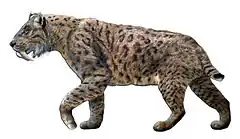| Longchuansmilus Temporal range: | |
|---|---|
| Scientific classification | |
| Domain: | Eukaryota |
| Kingdom: | Animalia |
| Phylum: | Chordata |
| Class: | Mammalia |
| Order: | Carnivora |
| Suborder: | Feliformia |
| Family: | Felidae |
| Subfamily: | †Machairodontinae |
| Tribe: | †Machairodontini |
| Genus: | †Longchuansmilus Jiangzuo et al., 2022 |
| Type species | |
| †Longchuansmilus xingyongi Jiangzuo et al., 2022 | |
Longchuansmilus is an extinct genus of machairodontine (sabre-toothed) cat that lived in China during the Late Miocene. The type and only species, Longchuansmilus xingyongi, was described in 2022.[1]
Etymology
The generic name "Longchuansmilus" is refers to the Longchuan River, which runs along the Yuanmou Basin, and the Greek σμίλη/smilē meaning "dagger". The specific name honours Xingyong Zhang, who has helped greatly in the discovery and study of the fossils at the Yuanmou hominid site.[1]
Palaeoecology
Longchuansmilus would have coexisted with proboscideans, the beaver Sinocastor, the rodent Kowalskia, the flying squirrel Pliopetaurista, the rabbit Alilepus, and the ape Lufengpithecus. Animals found near the fossil include tapirs, insectivores, flying squirrels, bamboo rats, freshwater birds, fish, frogs, turtles, crocodiles, beavers, otters and terrestrial birds, all which point to a swampy or lacustrine environment.[2]
References
- 1 2 Jiangzuo, Q.; Li, S.; Fu, J.; Wang, S.; Ji, X.; Duan, M.; Che, D. (2022). "Fossil Felidae (Carnivora: Mammalia) from the Yuanmou hominid site, southern China (Late Miocene) and its significance in the living environment of the fossil ape". Zoological Journal of the Linnean Society. 196 (3): 1156–1174. doi:10.1093/zoolinnean/zlab116.
- ↑ Chang, Lin; et al. (2015). "Pollen evidence of the palaeoenvironments of Lufengpithecus lufengensis in the Zhaotong Basin, southeastern margin of the Tibetan Plateau". Palaeogeography, Palaeoclimatology, Palaeoecology. 435: 95–104. Bibcode:2015PPP...435...95C. doi:10.1016/j.palaeo.2015.06.007.
